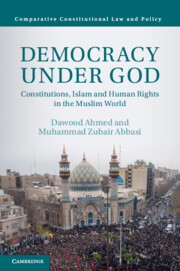Introduction
Published online by Cambridge University Press: 23 February 2023
Summary
On July 3, 2013, General Abdel Fattah el-Sisi, Egyptian Army Chief, ousted President Mohamed Morsi from power. Morsi, elected in 2013, had been Egypt’s first ever democratically elected president. Following the coup, the Chief Justice of the Supreme Constitutional Court of Egypt, Adly Mansour, was installed as interim president; Morsi was put under house arrest and several members of the Muslim Brotherhood – the political party to which Morsi belonged - were either arrested or killed. General el-Sisi also suspended the 2012 constitution, which was promulgated only a few months earlier, and issued a constitutional decree to make amendments to the constitution.1 The amendments were to be proposed by a constitutional committee composed of fifty members.2 The committee had hardly begun its work when foreign observers began to refocus most of their attention on speculating just how “Islamic” the amended constitution might be.3 And indeed, the committee was soon in a gridlock over the role of Islam in the new constitution.4 Egypt’s 1971 and 2012 constitutions had contained clauses entrenching the principles of Islamic law as the primary source of legislation; accordingly, some had called the 2012 constitution an “Islamic” Constitution, while others had alleged that it leaned toward “conservative” Islam.
- Type
- Chapter
- Information
- Democracy under GodConstitutions, Islam and Human Rights in the Muslim World, pp. 1 - 10Publisher: Cambridge University PressPrint publication year: 2023

